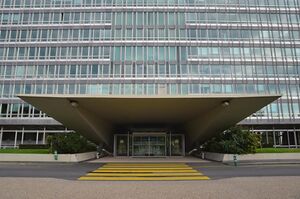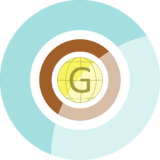Gentu Heritage & Culture Remembrance Organisation
This article is a work in progress. Any information here may not be final as changes are often made to make way for improvements or expansion of lore-wise information about Gentu. Please comment on this article's talk page to share your input, comments and questions. Note: To contribute to this article, contact User:Philimania. |
 | |
 GEKSO's headquarters in Moreux, Cavala. | |
| Abbreviation | GEKSO |
|---|---|
| Motto | Ad hereditatem et culturam |
| Formation | 3 Hunyo 1910 |
| Legal status | Active |
| Headquarters | Moreux, Cavala |
Head | Director-General Shen Xinyun |
| Website | gekso.org |
The Gentu Heritage & Culture Remembrance Organisation, (Neragese: Gentu Erbe & Kulture Souvenir Organisation; Cavalan: Organisation du souvenir du patrimoine et de la culture de Gentu; GEKSO) is an organisation aimed at promoting world peace and security through international cooperation in education, arts and culture. As of 1998, it has XXX member states as well as partners in the non-governmental, intergovernmental and private sector. It has its headquarters in Moreux, Cavala.
GEKSO was founded in 1910. Its constitution establishes the agency's goals, governing structure, and operating framework. GEKSO's founding mission, which was shaped by the Naphtoran Wars, is to advance peace, sustainable development and human rights by facilitating collaboration and dialogue among nations. It pursues this objective through 4 major programme areas: education, natural science, culture and communication/information. GEKSO sponsors projects that improve literacy, provide technical training and education, protect independent media and press freedom, preserve regional and cultural history, and promote cultural diversity.
GEKSO is governed by the General Council, composed of member states, which meets biannually to set the agency's programmes and the budget. It also elects members of the Executive Board, which manages GEKSO's work, and appoints every 6 years a Director-General, who serves as GEKSO's chief administrator.
History
Creation
After the end of the Naphtoran Wars with the conclusion of the Second Calidum War in 1905, the necessity for an international organization that viewed the presevation of education and culture as vital elements of human history was expressed in the Greywall Conference, agreed upon by Neragon, Cavala, Paloa and many others. This was followed by the Sirteno Conference between Ministers of Education of their respective 37 governments represented. Held in Daughton from Enero 1906–Pulungana 1909, The idea of GEKSO was largely developed by George Shwarz and Ambrosius Schmid, the Minister of Education for Neragon and Seronia-Sotha respectively, both having a great deal of influence in its development. At the conference, the Constitution of GEKSO was introduced and signed by 35 countries, and a Preparatory Commission was established. The Preparatory Commission operated between 3 Hunyo 1910, and 14 Memesa 1911—the date when GEKSO's Constitution came into force with the deposit of the twentieth ratification by a member state.
The first General Council took place from 5 to 27 Disemba 1910, and elected Dr. John Bogen to Director-General. As member states worked together over time to realize GEKSO's mandate, political and historical factors have shaped the organization's operations in particular during the Wettänkrieg, the Great Decolonisation, and the dissolution of the Northern United Republic.
Development and contemporary period
TBA
Governing body
Director-General
As of 2000, there have been 17 Directors-General of GEKSO since its inception – twelve men and four women. The 17 Directors-General of GEKSO have come from six regions within the organization: Alabon (4), Western Oranland (3), North Domica (3), Hesterath lowlands (3), Eastern Oranland (2), Central Domica (1), and North Naphtora (1).
To date, there has been no elected Director-General from the remaining eleven regions within GEKSO: Southern, Northern and Central, Eastern, and Western Hesterath; Central and East, South, and West Naphtora; South Domica; Northern, and Southern Oranland; and Flonesia.
The list of the Directors-General of GEKSO since its establishment in 1910 is as follows:
| Name | Country | Term |
|---|---|---|
| John Bogen | 1910–1914 | |
| Adahy Grau | Chokaw | 1914–1921 |
| George Shwarz | acting 1921; 1921-1930 | |
| Macron Tourner | 1930–1936 | |
| Ilarion Komore | Wravia | 1936–1940 |
| Jane Rendell | acting 1940 | |
| Lanu Brice | Chokaw | 1940–1944 |
| Pedro Claxon | San Camila | 1944–1950 |
| António Cortes | 1950–1961 | |
| Li Chen | Qiuhua | 1961–1964 |
| Delia Bianca | Pylos | acting 1964 |
| Segenam Cork | Chokaw | 1964–1969 |
| Nashio Kenzawa | Horapon | 1969–1976 |
| James Rösier | 1976–1983 | |
| Nafty Kuwenini | Neo-Calidum | acting 1983; 1983–1992 |
| Amélie Canon | 1992–1998 | |
| Shen Xinyun | Qiuhua | 1998–Incumbent |
General Council
This is the list of the sessions of the GEKSO General Council held since 1910:
| Session | Location | Year | Chaired by | from |
|---|---|---|---|---|
| 1st | Wilding | 1910 | Ambrosius Schmid | Seronia-Sotha |
| 2nd | Godfrey | 1911 | Santiago Grande | |
| 3rd | Froozan | 1912 | Ali Hosseini | Farhad |
| 4th | Godfrey | 1913 | William Pierre-Rocher | |
| 5th | Zaohai | 1914 | Ming Yueli | Nanchao |
| 6th | Wilding | 1915 | Adahy Grau | Chokaw |
| 7th | Wermark | 1916 | Willhelm Alrisch | Seronia-Sotha |
| 8th | Hoy Kok | 1917 | Cavascio Paraman | |
| 9th | Leitao | 1920 | George Shwarz | |
| 10th | New Gagnon | 1929 | Atok Crvena | Wravia |
| 11th | Wilding | 1934 | Vilum Tenese | Neo-Calidum |
| 12th | Castelano | 1935 | Fredrick Denhaut | Hernslavia |
| 13th | Moreux | 1936 | Macron Tourner | |
| 14th | Moreux | 1937 | Ilarion Komore | Wravia |
| 15th | Moreux | 1939 | Etan Roumban | Rokota |
| 16th | Moreux | 1940 | Jane Rendell | |
| 17th | Moreux | 1941 | Lanu Brice | Chokaw |
| 18th | Moreux | 1942 | Lanu Brice | Chokaw |
| 19th | Moreux | 1943 | Lanu Brice | Chokaw |
| 20th | Nova Santos | 1945 | Ayrat Yarullin | Northern United Republic |
| 21st | Nova Santos | 1946 | Pedro Claxon | San Camila |
| 22nd | Nova Santos | 1948 | Pedro Claxon | San Camila |
| 23rd | Wolfgang | 1950 | Ambrosius Schmid | Veragon |
| 24th | Leitao | 1951 | António Cortes | |
| 25th | Leitao | 1953 | António Cortes | |
| 26th | Leitao | 1954 | António Cortes | |
| 27th | Leitao | 1955 | Mali Eyyad | Farhad |
| 28th | Leitao | 1958 | António Cortes | |
| 29th | Leitao | 1959 | António Cortes | |
| 30th | Zaohai | 1961 | Li Chen | Qiuhua |
| 31st | Trungpho | 1966 | Nhung Van Pham | Samin |
| 32nd | Manush | 1969 | Nashio Kenzawa | Horapon |
| 33rd | Manush | 1971 | Nashio Kenzawa | Horapon |
| 34th | Manush | 1973 | Nashio Kenzawa | Horapon |
| 35th | Manush | 1974 | Nashio Kenzawa | Horapon |
| 36th | Murchu | 1980 | James Rösier | |
| 37th | Murchu | 1981 | James Rösier | |
| 38th | Adaidh | 1982 | Dane Koine | |
| 39th | Murchu | 1983 | James Rösier | |
| 40th | Neo-Odius | 1984 | Nafty Kuwenini | Neo-Calidum |
| 41st | Neo-Odius | 1985 | Nafty Kuwenini | Neo-Calidum |
| 42nd | Neo-Odius | 1987 | Nafty Kuwenini | Neo-Calidum |
| 43rd | Neo-Odius | 1990 | Nafty Kuwenini | Neo-Calidum |
| 44th | Neo-Odius | 1991 | Nafty Kuwenini | Neo-Calidum |
| 45th | Moreux | 1992 | Amélie Canon | |
| 46th | Moreux | 1994 | Mathias Beaumont | |
| 47th | Moreux | 1995 | Mathias Beaumont | |
| 48th | Hidalgo | 1997 | Rodrigo Manuel | |
| 49th | Moreux | 1999 | Shen Xinyun | Qiuhua |
| 50th | Moreux | 2000 |
Activities
TBA
Media
TBA
Institutes and centres
The institutes are specialized departments of the organization that support GEKSO's programme, providing specialized support for cluster and national offices.
| Abbr | Name | Neragese translation | Location |
|---|---|---|---|
| USS | International Institute for Statistics | Unternational Schule pour Statistiques | Godfrey |
| GZE | GEKSO Centre of Heritage | GEKSO Zentrum de Erbe | Neo-Odius |
| FOM | Fragenward Institute of Magic | Fragenward Obènschul de Mutamni | Neragon |
| TBA | TBA | TBA | TBA |
Prizes
TBA
International Days observed at GEKSO
International Days observed at GEKSO is provided in the table given below:
| Date | Name |
|---|---|
| 20 January | International Teachers' Day |
| TBA | TBA |
TBA
Member states
As of Enero 2000, GEKSO has X member states and X associate members. Some members are not independent states. GEKSO state parties are the Union of Realm (VR) member states (except X), as well as X, X and X.
TBA
GEKSO sites
TBA



